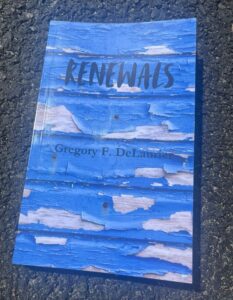
by Gregory F. DeLaurier
On February 20, 2025, I published my first novel, Renewals. The story follows Richard, an academic who returns to his hometown to discover a scam that has ruined the city. United with his friends and family, he tries to uncover the truth behind the corruption. It’s available at Bookshop.org (benefits Molly’s Bookstore in Melrose, MA), Barnesandnoble.com, Amazon.com (of course), and perhaps elsewhere, I don’t know.
When I was an academic, I published a lot of nonfiction, some of it award winning. Upon retirement, I turned to my first love, fiction writing. I’ve written quite a few short stories, many published in numerous places, including Palette. But I’d never tried a novel, so I wrote one. I like how it turned out, and hope you do too. I learned much along the way, and thought sharing a bit of my experience might be useful to those working on or thinking about working on a novel. So here goes…
1. Use your title to capture a key theme of your story.
Titles can be tricky. They’re meant to entice, I guess, but also offer a hint of what the novel’s about. No Country for Old Men is one that comes to mind. The original title of my novel was Urban Renewal, but that didn’t quite make it, sounded like a textbook. So to Renewals. More interesting and captures dual themes of the book: the renewal of a city decimated by a criminal gang, but also the renewal of the lives of those characters who find themselves on the losing side of life. More on this below.
2. Find inspiration for your setting in your own backyard; after all, you know it best.
I’m not so sure how well this works for, say, science fiction (unless you’ve been to Planet Xerces) or historical fiction (unless you’re best buds with Marie Antoinette), but for novice novelists this seems like good advice.
I grew up in a small working-class city in Northern New York. It once had a lively downtown where on any Saturday it would be filled with shoppers and teenagers, like me, hanging out. But in the early 1970s it all changed; urban renewal had hit. In my hometown’s case urban renewal came in the form of what was supposed to be a pedestrian mall, but no one came and the downtown died, as did the spirit of the city. This always saddened me, and I decided a fictional account might best capture the essence of what happened to places like my hometown.
But Renewals is not just about the gang of characters who are fighting the evil doers responsible for their town’s demise. It is also about the characters themselves who are lost. For instance, a sexually abused and exploited young woman learns to find herself and her autonomy; a young ex-con discovers he is intelligent and capable and may have a future. I truly believe people, both collectively and as individuals, are capable of change. But it takes courage and support for real renewal to happen.
3. When other writers comment on your work, listen.
Don’t write alone. I belong to a writers’ group, as many of you no doubt do as well. We share and comment on each other’s works. The critique and advice (and also support) I’ve received—what works, what doesn’t, where to cut, where to add—has been invaluable to making my novel much better than it would otherwise be.
But also there’s the wonderful writers associated with FYACS. They are very generous in sharing their knowledge and experience. FYACS’s writing sessions and workshops have inspired me and taught me much. Such a rich resource in my own fair city of Melrose.

4. Read books whose voices inspire you.
First of all I want to acknowledge my triumvirate of great storytellers: Elmore Leonard, Robert B. Parker, George V. Higgins (I’m on a personal crusade to have Higgins rediscovered. A great writer). All are unequaled in moving a story along through dialogue, creating believable characters, and blending humor with at times quite violent scenes. If you read my novel, you’ll see their influence is there.
So many books inspire me, yet I don’t dare attempt to write like them, they’re too good.From Amy Tan to Cormac McCarthy, from James Baldwin (both his fiction and nonfiction) to Danya Kukafka whose novel Notes on an Execution is simply brilliant, the list goes on.
Find the books that inspire you and read, read, read.
5. Writing is hard.
Keep at it.
6. Self-publishing is easy, getting noticed not so easy.
When you self-publish you’re pretty much on your own getting your novel noticed and selling. In one word, it takes HUSTLE. Do anything and everything you can to let people know about your work. You can spend a lot of money (into the $1,000s) or very little (like me). But don’t assume because your book is so good, it will immediately become a bestseller. Maybe it will, maybe it won’t. Still, hustle. But in the end we write because we love to write; that is the reward.
GOOD LUCK!
Greg F. DeLaurier is a resident of Melrose and a retired college professor who has returned to his first love, fiction writing. In addition to Renewals, his first novel, he has published a number of short stories in various places, including Palette. Greg has a daughter who lives in New York City, and a son entering his fourth year at Berklee. He enjoys long walks on the beach and pickleball (not true, he strongly dislikes both). He is grateful to the wonderful writers at FYACS who have generously shared their knowledge and from whom he has learned much.
For suggestions on specific places to publish and promote your novel feel free to contact Greg at gdelaurier@comcast.net.
Read more stories on Palette.
